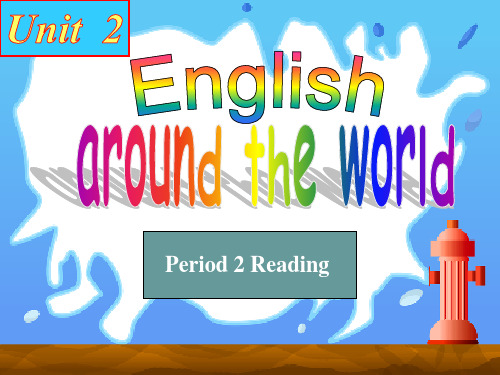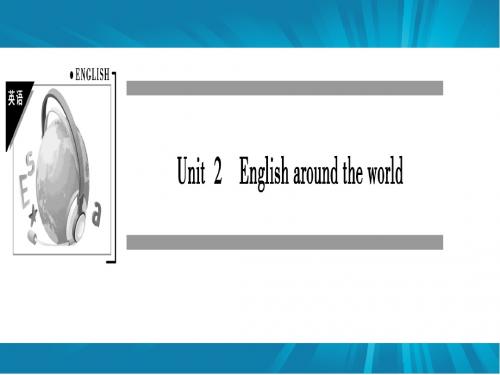高一英语必修一第二单元课件
高一英语必修1_Unit2课件

is concerned with He _______________________________that plan. 3 As far as I am concerned, I agree with what you said. 就…而言,对…来说
谚语
Some proverbs about friendship
A life without a friend is a life without the sun
人生没有朋友,犹如生活没有了太阳 .
A man who has friends must show himself friendly.
要有朋友,必须以友谊待人.
1.add up 加起来 合计 Add up all the money that I should pay you. 2.add up to 总计 The number of students adds up to 2,000. 3.add to 增加 The bad weather added to our difficulties. 4.add…to… 把…加在…上 If you add 5 to 3 you will get 8.
get sb. doing sth. 让某人一直做某事
get sb. to do sth.
让某人做某事
have sb. doing sth. 让某人一直做某事
have sb. do sth. 让某人做某事
3 upset 1. adj.
2. V.
Are you upset when the new term begins? Does the new school term upset you ?
人教版高一英语必修一Unit_2_词汇教学 PPT课件 图文

•
present sb with sth 把某物送给某人
•
present sb to sb 把某人介绍给某人
• Eg: When Mr. Brown left the firm, the director
presented a gold watch to him.
• The mayor presented the winner with a silver cup.
handwriting.
• such as
• (1)例如……
• such as 和 for example/instance都可作“例如” 讲,但such as用来例举事物,放在被列举的
事物和前面的名词之间。其后直接跟名词,
没有逗号,一般不与and so on连用;for example/instance用来举例说明,可用作插入 语用在句子中,后面一般有逗号。
• 注意:
• come up作“被提出”“被谈到”讲时为不 及物动词,不用于被动语态,它用于下列 两种结构中:sb come up with sth 和 sth come up.
• base vt.或n. • (1)建于……之上,以……为根据 搭配:base…on/upon… 把……建立在……上
• Eg: You must make good use of any opportunity to practise English.
• 搭配: make good use of 好好利用
•
make full use of 充分利用
•
make better use of 更好地利用
•
make the best use of 最好地利用
• Eg: The Titanic sank on its maiden voyage.
高中英语必修一第二单元(课堂PPT)

of the world C. in the time of Shakespeare D. in the 12th century 2. Which of the following statements is true?
的时间和旅行的距离, 尤指较长距离 的或定期的旅行; trip用作可数名词, 表示非定期的, 也许较短的往返旅行; voyage则常指海上旅行或太空旅行。 ① Air travel is becoming cheaper. ② He’s on his travels again. ③ Lily had a long and difficult journey
A second language in India, Pakistan, Nigeria the Philippines, and HK and so on.
A foreign language in China, and so on.
7
We can see that English is spoken all over the world.
You all have learnt English for at least 3 years. Do you know in which countries
people speak English?
4
U.K.
U.S.A.
Canada
Australia
New Zealand South Africa
22
Careful reading: Para 1--Development of English
the end of the 16th century
高中英语 必修一unit2 课件

Of all the stars, the sun is nearest to the earth. He began to play violin at the age of 5. I have never been to Himalaya Mountains. He is from United States of America. Greens are going to Mount Emei next month. Lucy and Lily look same.
There is tree on the ground. She is player of the team. fox is more clever than pig .
• •
•
•
一些不用冠词的情况:
专有名词和(第一次使用)一些不可数名词时前面通常不用。如:China is a very large country.(中国是个大国) / Man needs air and water.(人类需要空气和水)
• 2普通名词是许多人或事物的共有名称。如:pupil, family, man, foot.
• (1)可数名词是可以用简单的数词进行计数的名词,如: box, child, orange; • (2)不可数名词是不可以用简单的数词进行计数的名词。如:water, news, oil,
population, information .
• • •
• •
•
• 不定代词:代替或修饰不特指的人或事物的代词叫不定代 词。
冠词
定冠词,不定冠词
不定冠词a / an的词的前面。a用在辅音开头的词前面; an用在元音开头
• • 基本用法: (1)表示某一个人或东西,但不具体说明何人或何物。 如:There is a dog lying on the ground.(有一只狗躺在地上。)
高中英语必修一Unit2整体ppt课件

5.我以前几乎从未看见过她。 I have _a_l_m_o_s_t_ never seen her before.
精选课件
31
2.because & because of 因为你的关心,我发现生活充满了希望。 1)Because you are concerned about me, I find that life is
New Zealand
精选课件
Ireland
14
Reading
精选课件
15
Do all the English speakers only speak one kind of English?
精选课件
16
Five kinds of English in the world
Canadian English British English American English Australian English Indian English
speakers as they have the largest populations. For those
who learn English as their first foreign language China
must have the largest number as it has the largest
Unit2 ENGLISH
AROUND THE WORLD (Period 1)
Let’s discover more about English!
Statue of Liberty
人教版高中英语必修一第二单元ppt课件

number example countries of speakers
the native language
375
million
USA, UK, Canada, Australia, South Africa, Ireland, New Zealand
the foreign language
750
Homework
1. Reread the passage and list the reasons why English is spoken in many countries.
2. Review the words and expressions in the passage and try to use it in the sentences with context.
words
British English American English
lift (电梯) petrol (汽油)
elevator gas
flat (公寓)
apartment
autumn
fall
underground(地铁) subway university(大学) college
rubbish(垃圾) garbage
Seeing English movies
As we all know English is very important nowadays. So we should study hard. How much do you know about the English language? Let’s do a quiz.
sweets.
A: Well, I want a can of beer and some candies.
人教版高中一年级英语必修一unit2--ppt.

【辨析】late,later, latter, lately
1) late 是形容词, 迟到的,晚的
如: You are late again!
你又迟到了。
2)later adj. 更迟的,更后的 是late的比较级,
adv. 稍后,随后
常与on连用。
eg. I'll tell you later. 我以后再告诉你。
Why do people all over the world want to learn English?
Tourism
Internet website
Trade
Entertainment (娱乐)
Learn in western university
Diplomacy( 外交)
From these we can see ….
(3)Come on! We’ll be late!__快_点_____ (4)The author’s new book just came out._发_表_,_出__版__
(5)My dream has at last come true._实_现_____ (6)The doctor came up with a cure for the disease._想_出_,__发现
It’s more and more important to have a good knowledge of English.
The Road to Modern English
Task 1: skimming
1. What’s the main idea of the passage ? The history and development(发展) of English.
人教版高一英语必修一课件:Unit2English around the word (共84张PPT)

• [联想发散] command后面跟从句时,从句谓语 用(should+)do/be done,以下动词具有相同的用 法: • 一坚持:insist; • 二命令:order,command; • 三建议:suggest,advise,recommend; • 四要求:demand,request,require,desire; • 再加一个敦促:urge。
我们的老师要求我们对考试做好充分的准备。 ② Don't respond to any e-mails r_e_q_u_e_s_t_in_g___(request)personal information , no matter
11.f_r_eq__u_e_n_t __ adj. 频繁的;
常见的 fr_e_q_u_e_n_t_ly___ adv. 常常;频繁地
12._la_t_t_e_r___ adj. 较后的;后半的;
(两者中)后者的 l_a_te_s_t___adj. 最新的;最近的 la_t_e_r___adv. 后来;adj.以后的 la_t_e_ly___ adv. 近来;最近
③The police commanded the witness to describe what had happened the day before.
→ The police commanded that the witness (s_h_o_u_l_d_)d__es_c_r_i_b_e__what had happened the day before.
3.The doctor said to me,“Come in.” →The doctort_o_ld____met_o_g_o___in.
- 1、下载文档前请自行甄别文档内容的完整性,平台不提供额外的编辑、内容补充、找答案等附加服务。
- 2、"仅部分预览"的文档,不可在线预览部分如存在完整性等问题,可反馈申请退款(可完整预览的文档不适用该条件!)。
- 3、如文档侵犯您的权益,请联系客服反馈,我们会尽快为您处理(人工客服工作时间:9:00-18:30)。
(1) 课题:English around the world(2) 教材分析与学生分析:Warming Up部分简要介绍了世界英语的分支以及英语语言在不同国家产生的差异,使学生感受英语语言的多文化、多层次、多元性,对英国英语和美国英语的不同有个粗浅的了解;Pre-Reading部分的两个问题引发学生对课文主题的思考,以便参加课堂活动;Reading 部分The Road to Modern English 简要说明了英语语言的起源、发展变化、形成原因,以及它的发展趋势。
Comprehending部分旨在检查学生对课文基本内容的理解程度; Learning about Language 部分主要通过各种练习帮助学生重温本单元前几个部分的所学习的新单词和短语,同时也通过新的例子展现了美国英语、英国英语的差异,并着重介绍了半单元的语法项目(祈使句及其间接引语);Using Language 部分中的Reading and talking主要介绍了当今世界各国各地说英语都有自己的特色,即便是美国东西部、南北部说话均有所不同。
(3) 课时安排:The first period: Speaking: Warming Up and Pre-ReadingThe second period: Reading The Road to modern EnglishThe third period: Reading (Language points)The forth Period:Learning about LanguageThe fifth period: Using LanguageThe sixth period: Listening(4)教学目标:① 知识与技能:了解英语在世界上的发展状况,认识各种各样带有民族、地域特色的英语;对英国英语和美国英语的差异有所了解,尤其是一些常用词汇,比如falt和apartment, lift 和elevator, rubber 和eraser等; 掌握本单元中出现的词汇、短语的用法;学会语言交际困难的表达法,如pardon, I beg your pardon?; 掌握祈使句及其间接引语的表达法。
② 过程与方法:本单元通过对“世界英语”这一话题的探讨,以加强学生对英语语言的了解,对当代语言特别是英语的发展趋势的了解。
在教授本单元时必须强调美国英语、澳大利亚英语、印度英语、新加坡英语等都有各自的规律和和惯用法。
要提防学生认为可以滥用英语词汇,随意违反英语语法规则或惯用法,不顾正常的发音、语调等。
在学生用书中的听力部分,原文真实的反映了灭国南部地区英语的方言和语音,旨在让学生感受一下将英语作为母语的本国人说话的一个侧面。
要注意掌握尺度,让学生感受一下、了解一下,点到为止,不提倡硬性模仿。
③ 情感态度与价值观:了解英国英语和美国英语的区别,两种英语不存在那种好与不好的问题。
可以给学生布置以下任务:通过对话形式,将所学过的英美说法的不同之处,按实际生活和想象编一段对话。
尽可能运用语言功能中表达语言困难的说法。
(5) 教学重点和难点:词汇:include role international native elevator flat apartment rub ber petrol gas modern culture actually present rule vocabul ary usage identity government rapidly candy lorry comman d request retell polite boss standard Midwestern Spanish e astern southeastern northwestern recognize accent lightning direction subway block短语: play a role (in) because of come up such as play a part (in)重点语法项目:祈使句及其间接引语难点:Expressing one’s idea on which kind of English one should learn; guess the name of speaker’s country by listening; how to tell the differences between a command and a request; how to change the pronoun when turning the direct speech into indirect speech.(6) 教学策略:Discussion, Student-centered vocabulary,learning, listening, pair work, teach grammar in real situation(7) 教学煤体设计: A projector and a tape recorder.(8) 教学过程:详见以下分课时教学设计。
(9) 课堂练习与课外作业设计:穿插于分课时教学设计中(10) 教学反思或值得改进的地方:见每个课时最后部分。
Period 1: Speaking Warming Up and Pre-ReadingAimsTo talk about varieties of EnglishTo discuss why do so many people speak EnglishProceduresI. Warming up1. Warming up by answering a questionnaire1). Tell the students they are going to answer a questionnaire about why they are learning English.2). Write the words: Reasons for learning a foreign language on the center of the board:3). Ask the students to suggest as many reasons as they can think of, for example, for work, as a hobby, to learn about other people, to travel, to read literature in the original, to read research papers, to meet foreigners, to surf the Internet, to pass exams, etc. Write their suggestions on the board as they make them.4). Divide the class into pairs.5). Give out each student one questionnaire paper.6). Explain the task. The students must question each other about their language learning needs (or motivations). T ell them that you are going to take in the questionnaires at the end, and that you’d like them to make clear notes. It works better if the two partners swap tasks (questions and answers) after each section of the questionnaire. If they wait till the end to swap, onestudent may use up all the time available.7). When the task is finished, ask a couple of students to summarize their partners’ answers. (This may develop into a class discussion about language needs).8). The students write five sentences on their feeling about learning English.9). Collect the questionnaires. Needs Analysis QuestionnaireInterviewer_______________Interviewee_______________Present use: situations and skillsReading (faxes, letters & reports)Listening & speaking (telephoning, meetings, negotiations, public speaking, socializing)Writing (faxes, letters & reports)Future use: expectations & ambitions课后反思:本课能比较好地完成教学目标,训练了学生说的能力,懂得如何表达自己的思想和意见。
使学生了解了世界各地的英语是有所不同的,特别是了解英国英语和美国英语的区别。
同时使学生感受到学习英语的重要性。
由于学生的口语水平有限,所以探讨的时候不是很深入。
Period 2 Reading:The Road to modern EnglishAimsTo talk about EnglishTo read about the history of English languageStep 1 SkimmingRead quickly to get the main idea of the text.Let the students find out key sentence of each paragraph or ask them to summarize the main point for each paragraph in their own words.Paragraph 1: The spread of the English language in the worldParagraph 2: Native speaker can understand each other but they may not be able to understand everything.Paragraph 3: All languages change when cultures communicate with one another.Paragraph 4: English is spoken as a foreign language or second language in Africa and Asia.Step 2 ScanningRead to locate particular information and complete the comprehending Exercise One.Step 3 Comprehending1. Check the answers to exercise 1 (page 102. Answer these questions (Page 11)Work in groups. Discuss the two questions and then ask two groups to report their answers to the class.1). Do you think it matters what kind of English you learn? Why?Possible answer:I don’t think so. Here are the reasons:★ Native speakers fr om different parts of the world have no difficulty in understanding each other despite the fact that they speak a bit differently.★ It is necessary for us to learn the narrow difference between different kinds of English if we hope to communicate fluently with native speakers of English from all over the world.★ Different kinds of English have the same language core. If you have got a good command of one kind, you will almost have no difficulty understanding another kind of English.(Any persuasive and supporting reason the students give can be accepted.)2) Why do you think people all over the world want to learnEnglish?Possible answer:The reasons why people all over the world want to learn English:★ With economy globalization, English has become th e best bridge to serve the purpose of people all over the world communicating with one another.★ However, like all major languages in the world, English is always changing. In order to adjust to native speakers from different parts of the world, it is a must for people all over the world to learn English, whether in English speaking countries or in non-English speaking countries.★ Also, people from different parts of the world speak English with various accent and dialects, and people have to learn about the difference between different kinds of English in order to avoid misunderstanding while communicating.课后反思:本课是阅读课。
